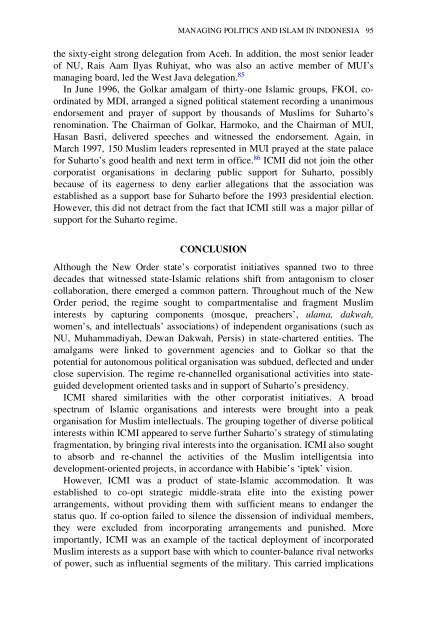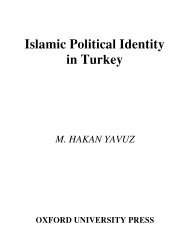Create successful ePaper yourself
Turn your PDF publications into a flip-book with our unique Google optimized e-Paper software.
MANAGING POLITICS AND ISLAM IN INDONESIA 95the sixty-eight strong delegation from Aceh. In addition, the most senior leaderof NU, Rais Aam Ilyas Ruhiyat, who was also an active member of MUI’smanag<strong>in</strong>g board, led the West Java delegation. 85In June 1996, the Golkar amalgam of thirty-one <strong>Islam</strong>ic groups, FKOI, coord<strong>in</strong>atedby MDI, arranged a signed political statement record<strong>in</strong>g a unanimousendorsement <strong>and</strong> prayer of support by thous<strong>and</strong>s of Muslims for Suharto’srenom<strong>in</strong>ation. The Chairman of Golkar, Harmoko, <strong>and</strong> the Chairman of MUI,Hasan Basri, delivered speeches <strong>and</strong> witnessed the endorsement. Aga<strong>in</strong>, <strong>in</strong>March 1997, 150 Muslim leaders represented <strong>in</strong> MUI prayed at the state palacefor Suharto’s good health <strong>and</strong> next term <strong>in</strong> office. 86 ICMI did not jo<strong>in</strong> the othercorporatist organisations <strong>in</strong> declar<strong>in</strong>g public support for Suharto, possiblybecause of its eagerness to deny earlier allegations that the association wasestablished as a support base for Suharto before the 1993 presidential election.However, this did not detract from the fact that ICMI still was a major pillar ofsupport for the Suharto regime.CONCLUSIONAlthough the New Order state’s corporatist <strong>in</strong>itiatives spanned two to threedecades that witnessed state-<strong>Islam</strong>ic relations shift from antagonism to closercollaboration, there emerged a common pattern. Throughout much of the NewOrder period, the regime sought to compartmentalise <strong>and</strong> fragment Muslim<strong>in</strong>terests by captur<strong>in</strong>g components (mosque, preachers’, ulama, dakwah,women’s, <strong>and</strong> <strong>in</strong>tellectuals’ associations) of <strong>in</strong>dependent organisations (such asNU, Muhammadiyah, Dewan Dakwah, Persis) <strong>in</strong> state-chartered entities. Theamalgams were l<strong>in</strong>ked to government agencies <strong>and</strong> to Golkar so that thepotential for autonomous political organisation was subdued, deflected <strong>and</strong> underclose supervision. The regime re-channelled organisational activities <strong>in</strong>to stateguideddevelopment oriented tasks <strong>and</strong> <strong>in</strong> support of Suharto’s presidency.ICMI shared similarities with the other corporatist <strong>in</strong>itiatives. A broadspectrum of <strong>Islam</strong>ic organisations <strong>and</strong> <strong>in</strong>terests were brought <strong>in</strong>to a peakorganisation for Muslim <strong>in</strong>tellectuals. The group<strong>in</strong>g together of diverse political<strong>in</strong>terests with<strong>in</strong> ICMI appeared to serve further Suharto’s strategy of stimulat<strong>in</strong>gfragmentation, by br<strong>in</strong>g<strong>in</strong>g rival <strong>in</strong>terests <strong>in</strong>to the organisation. ICMI also soughtto absorb <strong>and</strong> re-channel the activities of the Muslim <strong>in</strong>telligentsia <strong>in</strong>todevelopment-oriented projects, <strong>in</strong> accordance with Habibie’s ‘iptek’ vision.However, ICMI was a product of state-<strong>Islam</strong>ic accommodation. It wasestablished to co-opt strategic middle-strata elite <strong>in</strong>to the exist<strong>in</strong>g powerarrangements, without provid<strong>in</strong>g them with sufficient means to endanger thestatus quo. If co-option failed to silence the dissension of <strong>in</strong>dividual members,they were excluded from <strong>in</strong>corporat<strong>in</strong>g arrangements <strong>and</strong> punished. Moreimportantly, ICMI was an example of the tactical deployment of <strong>in</strong>corporatedMuslim <strong>in</strong>terests as a support base with which to counter-balance rival networksof power, such as <strong>in</strong>fluential segments of the military. This carried implications




